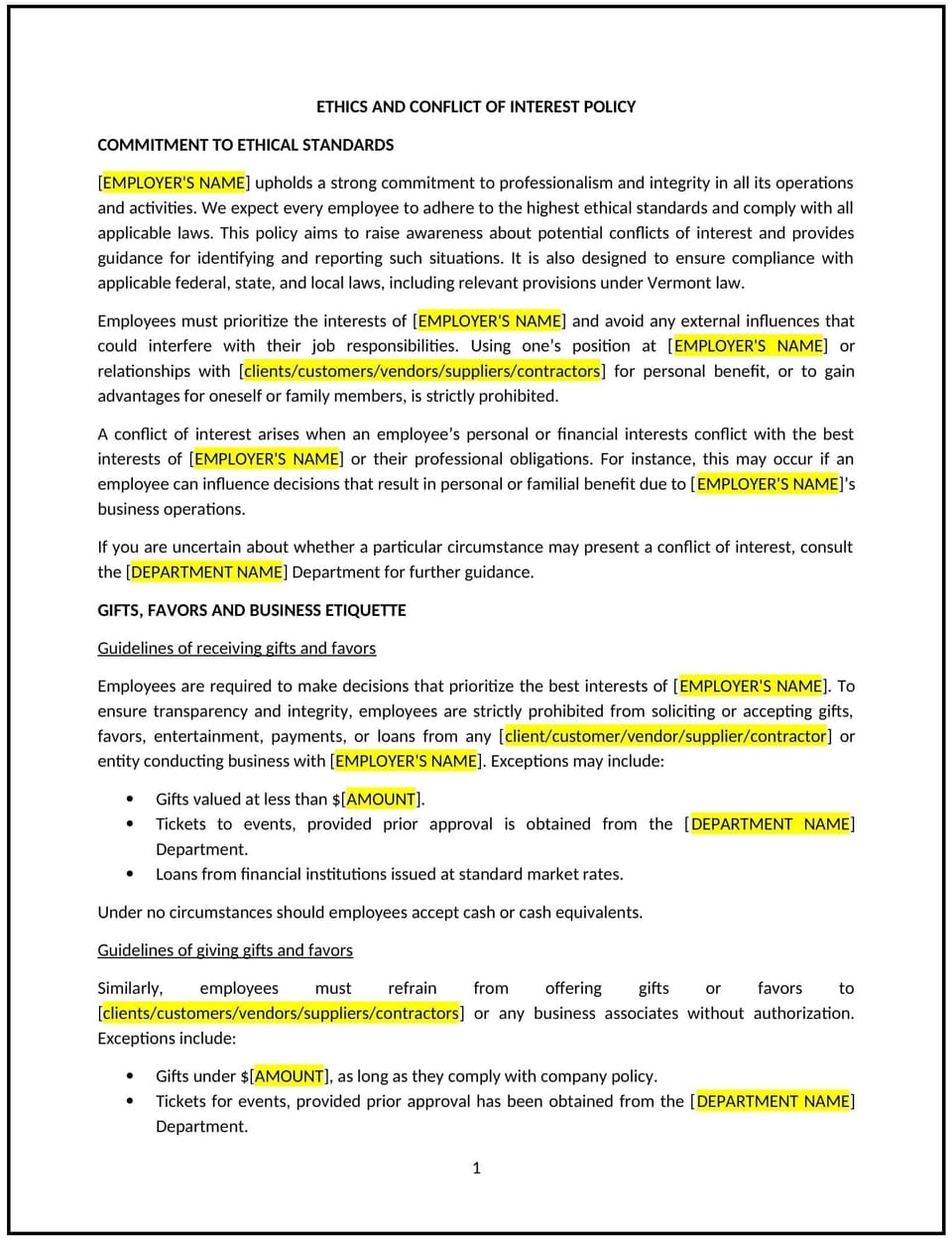Ethics and conflict of interest policy (Vermont): Free template

Ethics and conflict of interest policy (Vermont)
This ethics and conflict of interest policy is designed to help Vermont businesses uphold ethical standards and ensure transparency in decision-making. It establishes guidelines for identifying and managing potential conflicts of interest, promoting integrity, and maintaining compliance with Vermont laws and organizational values.
By adopting this policy, businesses can safeguard their reputation, build trust, and foster a culture of accountability.
How to use this ethics and conflict of interest policy (Vermont)
- Define ethical expectations: Specify the company’s commitment to integrity, honesty, and fairness in all business dealings.
- Identify conflicts of interest: Provide examples of potential conflicts, such as personal relationships, financial interests, or outside employment that could influence decision-making.
- Include disclosure requirements: Require employees to disclose potential conflicts of interest to HR or management promptly.
- Outline review processes: Establish procedures for reviewing disclosures and determining appropriate actions to mitigate conflicts.
- Address prohibited activities: Clarify actions that are not allowed, such as accepting excessive gifts or engaging in unauthorized outside employment.
- Emphasize accountability: Require employees to report unethical behavior or conflicts of interest involving others.
- Monitor compliance: Regularly review practices to ensure alignment with Vermont laws and company standards.
Benefits of using this ethics and conflict of interest policy (Vermont)
This policy provides several benefits for Vermont businesses:
- Promotes integrity: Establishes clear expectations for ethical behavior and accountability.
- Reduces risks: Minimizes the potential for legal, financial, or reputational damage from unethical practices.
- Enhances compliance: Aligns with Vermont regulations and industry best practices.
- Builds trust: Demonstrates the company’s commitment to transparency and fairness.
- Strengthens culture: Fosters a workplace environment that prioritizes ethical decision-making.
Tips for using this ethics and conflict of interest policy (Vermont)
- Communicate the policy: Share the policy with employees during onboarding and make it accessible in the employee handbook or intranet.
- Provide training: Offer regular training on identifying conflicts of interest and promoting ethical decision-making.
- Encourage disclosure: Create a supportive environment where employees feel comfortable disclosing potential conflicts.
- Enforce consistently: Apply the policy uniformly to all employees, regardless of role or seniority.
- Update regularly: Revise the policy to reflect changes in Vermont laws, workplace practices, or industry standards.
Q: What constitutes a conflict of interest under this policy?
A: A conflict of interest occurs when an employee’s personal, financial, or other interests could interfere with their professional responsibilities or the company’s interests.
Q: How should employees disclose potential conflicts of interest?
A: Employees should report potential conflicts to HR or their manager by submitting a disclosure form or providing a written statement.
Q: What happens after a conflict of interest is disclosed?
A: The company will review the disclosure, assess the potential impact, and determine appropriate actions to mitigate or resolve the conflict.
Q: Are employees allowed to accept gifts from vendors?
A: Employees may accept nominal gifts within the company’s guidelines, but excessive or inappropriate gifts that could influence decisions are prohibited.
Q: How are reports of unethical behavior handled?
A: Reports are investigated promptly and confidentially, with corrective actions taken as necessary to address violations.
Q: Are employees protected from retaliation for reporting conflicts of interest?
A: Yes, employees who report conflicts or unethical behavior in good faith are fully protected from retaliation under this policy.
Q: How often is this policy reviewed?
A: This policy is reviewed annually or whenever significant changes occur in Vermont laws, workplace practices, or organizational priorities.
Q: Does this policy apply to contractors and vendors?
A: Yes, contractors and vendors working with the company are expected to adhere to the principles outlined in this policy.
This article contains general legal information and does not contain legal advice. Cobrief is not a law firm or a substitute for an attorney or law firm. The law is complex and changes often. For legal advice, please ask a lawyer.


